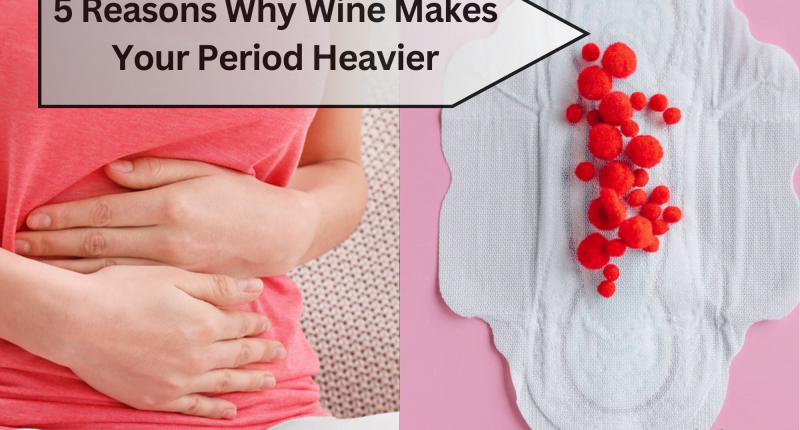5 reasons why wine makes your period heavier – As if periods weren’t already difficult enough, some women may experience an increase in the flow of their menstrual cycle when consuming alcohol, particularly wine. While this may be a surprising and frustrating discovery, there are some scientific reasons behind why wine can make your period heavier. In this article, we will explore 5 reasons why wine makes your period heavier.
The Relationship between Alcohol and Periods
Before we dive into the reasons behind why wine can make your period heavier, it’s important to understand the relationship between alcohol and periods. When women consume alcohol, it can have a significant impact on their menstrual cycle. Not only can alcohol disrupt hormone levels, but it can also affect blood flow, cause dehydration, and affect liver function.
Also read | 11 Signs You’re Losing Too Much Blood During Period
Reason #1: Alcohol can Disrupt Hormone Levels
Alcohol consumption can disrupt hormone levels in the body, particularly those related to estrogen and progesterone. These hormones play a significant role in regulating the menstrual cycle, and when their levels are altered, it can lead to changes in the flow and duration of periods. Alcohol consumption can also lead to an increase in the production of testosterone, which can cause an increase in hair growth and acne, both of which are common symptoms of PCOS (polycystic ovary syndrome).
Reason #2: Wine Contains Histamines
Histamines are naturally occurring chemicals in wine that can cause allergic reactions and inflammation in some people. These histamines can also cause blood vessels to dilate, which can increase blood flow and lead to heavier periods. Red wine, in particular, contains more histamines than white wine, making it more likely to cause an increase in menstrual flow.
Reason #3: Wine Can Increase Blood Flow
Alcohol consumption can increase blood flow throughout the body, including the pelvic region. This increased blood flow can lead to heavier periods and more cramping. Additionally, alcohol can cause blood vessels to dilate, which can further increase blood flow and lead to more significant menstrual bleeding.
Reason #4: Wine Can Lead to Dehydration
Alcohol is a diuretic, meaning it can cause the body to lose fluids and become dehydrated. When the body is dehydrated, it can cause the uterus to contract, leading to more significant menstrual cramping and heavier bleeding. It’s essential to drink plenty of water and stay hydrated when consuming alcohol, particularly during your period.
Reason #5: Wine Can Affect Liver Function
The liver plays a significant role in regulating hormone levels in the body, including those related to the menstrual cycle. When alcohol is consumed, the liver must work harder to process it, leading to a decrease in its ability to regulate hormones effectively. This decrease in liver function can cause changes in the menstrual cycle, including heavier periods.
Tips for Managing Period Symptoms
While it may be challenging to avoid drinking wine during your period, there are some tips you can follow to manage period symptoms:
- Drink plenty of water to stay hydrated
- Limit alcohol consumption
- Avoid red wine or limit your intake
- Practice relaxation techniques, such as yoga or meditation
- Take over-the-counter pain medication, such as ibuprofen, for cramping
Also read | Period Blood Bright Red and Watery: Is It Normal?
Conclusion
While wine can be a pleasant beverage to enjoy, it’s important to be aware of its potential impact on menstrual cycles. Wine can make your period heavier due to its ability to disrupt hormone levels, contain histamines, increase blood flow, cause dehydration, and affect liver function. By understanding these reasons and following some tips for managing period symptoms, women can help alleviate the effects of wine on their menstrual cycle. It’s crucial to listen to your body and make adjustments to your lifestyle as necessary to ensure a healthy and comfortable period.
FAQs
A: Yes, other types of alcohol can also have similar effects on the menstrual cycle due to their ability to disrupt hormone levels and increase blood flow.
A: It’s essential to listen to your body and limit your alcohol consumption based on how it affects your menstrual cycle. Some women may be more sensitive to the effects of alcohol than others.
A: Yes, other factors such as stress, hormonal imbalances, and certain medical conditions can also affect the flow and duration of periods.
A: Yes, regular exercise can help alleviate period symptoms such as cramping, bloating, and mood changes.
A: If you experience significant changes in your menstrual cycle, such as a sudden increase in flow or a change in the duration of your period, it’s important to consult a doctor to rule out any underlying medical conditions.
Copyright © 2022 Soundhealthandlastingwealth.










